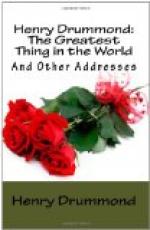CHRIST WAS VERY FOND
of these men. The outsiders always interested Him, and touched Him. The orthodox people—the Pharisees—He was much less interested in. He went with publicans and sinners—with people who were in revolt against the respectability, intellectual and religious, of the day. And following Him, we are entitled to give sympathetic consideration to those whom He loved and took trouble with.
First, let me speak for a moment or two about
THE ORIGIN OF DOUBT.
In the first place, we are born questioners. Look at the wonderment of a little child in its eyes before it can speak. The child’s great word when it begins to speak is, “Why?” Every child is full of every kind of question, about every kind of thing, that moves, and shines, and changes, in the little world in which it lives.
That is the incipient doubt in the nature of man. Respect doubt for its origin. It is an inevitable thing. It is not a thing to be crushed. It is a part of man as God made him. Heresy is truth in the making, and doubt is the prelude of knowledge.
Secondly: The world is a Sphinx. It is a vast riddle—an unfathomable mystery; and on every side there is temptation to questioning. In every leaf, in every cell of every leaf, there are a hundred problems. There are ten good years of a man’s life in investigating what is in a leaf, and there are five good years more in investigating the things that are in the things that are in the leaf. God has planned the world to incite men to intellectual activity.
Thirdly: The instrument with which we attempt to investigate truth is impaired. Some say it fell, and the glass is broken. Some say prejudice, heredity, or sin, have spoiled its sight, and have blinded our eyes and deadened our ears. In any case the instruments with which we work upon truth, even in the strongest men, are feeble and inadequate to their tremendous task.
And in the fourth place, all religious truths are doubtable. There is no absolute truth for any one of them. Even that fundamental truth—the existence of a God—no man can prove by reason. The ordinary proof for the existence of God involves either an assumption, argument in a circle, or a contradiction. The impression of God is kept up by experience, not by logic. And hence, when the experimental religion of a man, of a community, or of a nation wanes, religion wanes—their idea of God grows indistinct, and that man, community or nation becomes infidel.
Bear in mind, then, that all religious truths are doubtable—even those which we hold most strongly.
What does this brief account of the origin of doubt teach us? It teaches us
GREAT INTELLECTUAL HUMILITY.




